
This year is “virtually certain” to be the warmest in 125,000 years, European Union scientists said on Wednesday, after data showed last month was the world’s hottest October in that period.
Last month smashed through the previous October temperature record, from 2019, by a massive margin, the EU’s Copernicus Climate Change Service (C3S) said.
“The record was broken by 0.4 degrees Celsius, which is a huge margin,” said C3S Deputy Director Samantha Burgess, who described the October temperature anomaly as “very extreme”.
The heat is a result of continued greenhouse gas emissions from human activity, combined with the emergence this year of the El Nino weather pattern, which warms the surface waters in the eastern Pacific Ocean.
Globally, the average surface air temperature in October was 1.7 degrees Celsius warmer than the same month in 1850-1900, which Copernicus defines as the pre-industrial period.
The record-breaking October means 2023 is now “virtually certain” to be the warmest year recorded, C3S said in a statement. The previous record was 2016 – another El Nino year.
Copernicus’ dataset goes back to 1940. “When we combine our data with the IPCC, then we can say that this is the warmest year for the last 125,000 years,” Burgess said.
LINK: https://www.reuters.com/business/environment/this-year-virtually-certain-be-warmest-125000-years-eu-scientists-say-2023-11-08/











